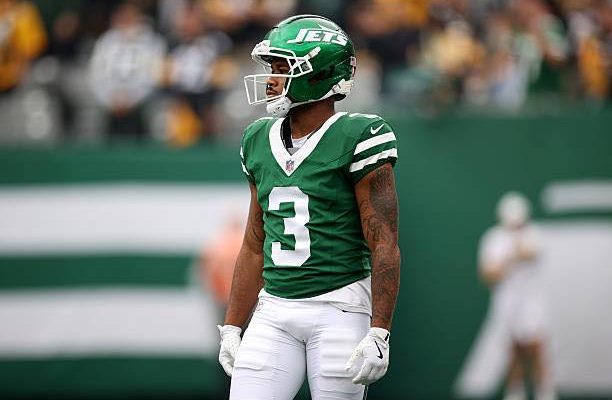The New York Jets have decided to release wide receiver and return specialist Xavier Gipson, following a costly mistake in their most recent game. This move, reported by respected NFL insider Brian Costello, highlights the brutal and unforgiving nature of professional football, where even one critical error can lead to severe consequences. Gipson, who had shown promise as a dynamic player capable of impacting both offense and special teams, unfortunately lost a key fumble in the Jets’ Sunday matchup. That fumble proved to be the turning point that ultimately sealed his fate with the team.
Xavier Gipson entered the NFL with a lot of excitement surrounding his potential. Coming from a solid college career, he was viewed as a player with versatility—someone who could contribute as a wide receiver while also making significant plays in the return game. In today’s NFL, players who can fill multiple roles on a roster have an elevated value, especially in areas such as kick and punt returns where field position can be drastically influenced. Gipson’s speed, agility, and ball skills made him a natural fit for these roles. Jets coaches and front office personnel likely saw him as a key part of their plans to improve their special teams and deepen their receiving corps.
However, football is a game of execution, and while talent opens doors, mistakes often close them. The fumble that Gipson lost on Sunday was a glaring moment in the game that not only hurt the Jets’ chances but also directly impacted their confidence in him. Fumbling, especially on special teams, can be one of the most damaging errors a player can make. Unlike some offensive missteps that can be mitigated by the overall performance of the team, a turnover like a lost fumble on a return can instantly shift momentum to the opposing team and often leads to points against. It’s a high-stakes responsibility that requires not only physical skill but also composure and focus under pressure.
Gipson’s miscue came at a critical juncture, and the Jets, who are in the midst of trying to build consistency and competitiveness, could ill afford such a mistake. The NFL is a league where roster spots are limited, and teams are constantly evaluating the cost-benefit ratio of each player on their roster. Young players like Gipson are often given a window to prove themselves, but that window can close quickly when turnovers happen in pivotal moments. It’s not just about the physical error; it’s also about trust. Coaches and coordinators need to be able to rely on players to protect the football, especially in special teams roles that can dramatically affect the flow of the game.
This release speaks volumes about the Jets’ current priorities and their urgency to fix issues that have plagued them in recent seasons. The organization is under pressure to improve, and every move they make is scrutinized by fans, media, and analysts alike. Losing a promising player is never an easy decision, but the Jets clearly felt that moving forward without Gipson was necessary to send a message about accountability and performance standards. It also underscores the harsh reality for many players on the fringe of the roster—every snap, every touch matters, and mistakes can be costly.
From Gipson’s perspective, this is undoubtedly a setback. He now finds himself in the uncertain territory that many NFL players experience—trying to find another opportunity to prove his worth. The league is filled with stories of players who have been released, only to catch on elsewhere and revitalize their careers. Gipson’s speed and versatility could attract attention from other teams in need of a return specialist or a depth receiver, but he will have to demonstrate improved ball security and consistency to convince them. This moment could serve as a wake-up call and motivation for Gipson to refine his skills and mental approach to the game.
The Jets’ decision also reflects the tough balance teams must strike between developing young talent and striving for immediate results. Fans often want to see their teams commit to promising players and nurture their growth, but the competitive nature of the NFL means that patience is sometimes in short supply. Coaches and executives have to weigh the long-term potential of a player against the immediate needs of the team. In Gipson’s case, it appears that the Jets prioritized immediate reliability and error-free play over waiting for a player to fully develop or correct mistakes.
Special teams coaches, in particular, have a notoriously low tolerance for turnovers. The importance of special teams cannot be overstated; games can be won or lost based on the effectiveness of return units, coverage teams, and kicking squads. When a player entrusted with handling the football on returns fails to secure it, it creates an automatic question mark around their reliability. For the Jets, who have had their share of struggles on special teams in recent years, every fumble is magnified and scrutinized intensely. Gipson’s error was not just a momentary lapse; it symbolized a potential liability the Jets could not afford.
Looking forward, the Jets will need to find a replacement for Gipson’s role. Whether they promote from within their current roster or look to free agency or the practice squad, the team’s special teams unit will undergo adjustments. Return specialists are often unsung heroes who don’t get much attention until a big play or a big mistake happens. The Jets now face the challenge of finding someone who can provide the explosiveness Gipson brought while minimizing risks. This is a critical role, as field position often dictates the flow of an NFL game and can heavily influence a team’s offensive opportunities.
For the Jets as an organization, this move is a reminder of the constant evaluation and turnover that defines NFL rosters. Players are competing not only against opponents on the field but also against teammates and new acquisitions off the field. Every practice, every game, and every moment counts. The margin for error is razor-thin, especially for players who have not yet established themselves as indispensable. Gipson’s release serves as a cautionary tale about the high stakes and pressure that come with playing in the league.
As for Gipson himself, his future remains uncertain but not bleak. The NFL is filled with second chances and stories of perseverance. If he can learn from this experience, tighten up his ball security, and continue to showcase the qualities that made him an attractive prospect in the first place, he could find another home. Teams are always on the lookout for athletes who can make a difference on special teams and add depth to their receiving groups. Gipson’s challenge now is to channel this disappointment into determination and prove that he belongs in the league.
Ultimately, the Jets’ decision to release Xavier Gipson after a key fumble highlights the unforgiving nature of professional football. It underscores the importance of execution, trust, and reliability, especially in critical roles like return specialist. For the Jets, it’s a move aimed at protecting their roster’s integrity and sending a message that mistakes, no matter who makes them, will have consequences. For Gipson, it is a pivotal moment in his career, one that will test his resilience and ability to bounce back. The road ahead may be difficult, but it’s far from over. Every player in the NFL faces adversity; how they respond to it often defines their legacy.



